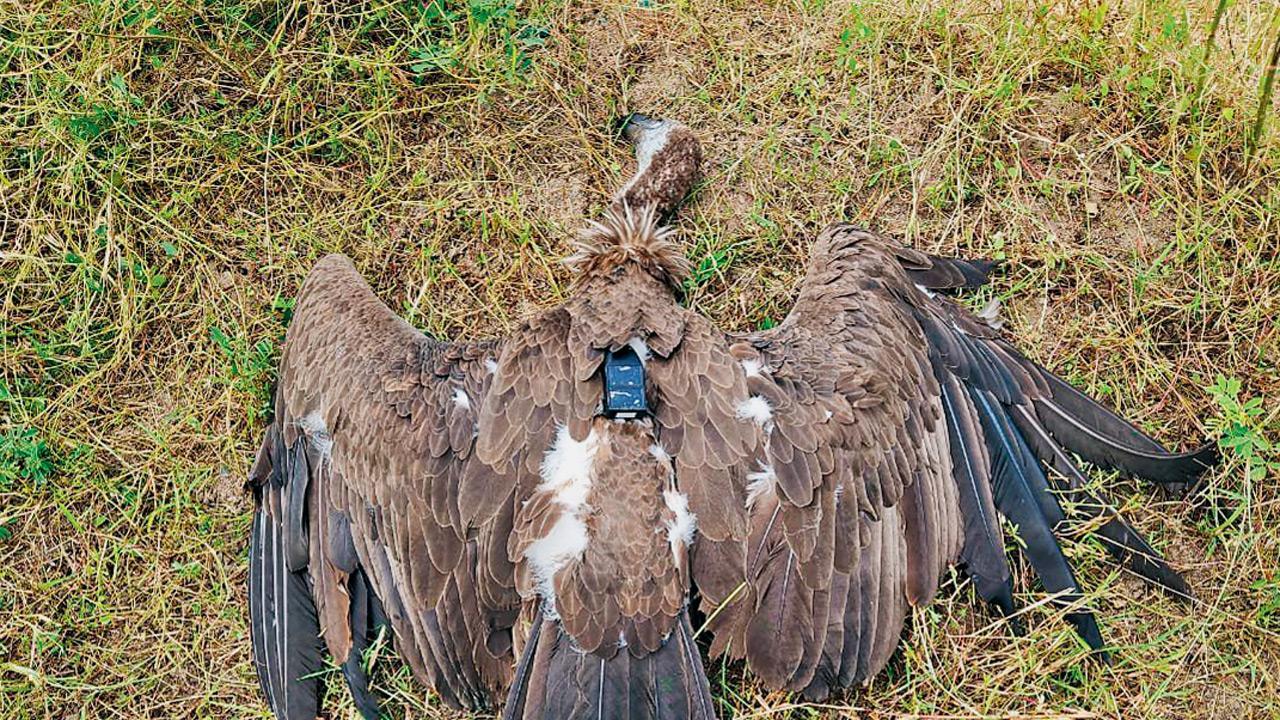On January 2, mid-day carried a story, ‘GPS-tagged vulture travels 4000 km from Tadoba sanctuary in Maharashtra to Tamil Nadu’, which highlighted how a vulture fitted with a satellite tag at Tadoba Andhari Tiger Reserve had reached Tamil Nadu. Before reaching the southern state, the vulture travelled from Maharashtra to Chhattisgarh, then Gujarat

The GPS-tagged vulture’s charred remains in Samudram, Tamil Nadu
The GPS-tagged N11 vulture that had travelled over 4000 km from Tadoba sanctuary in Maharashtra to Tamil Nadu died of electrocution while trying to fly past an electric wire near the Arimalam Thanjur village, in Pudukottai division of Tamil Nadu.
ADVERTISEMENT
Confirming the development, Bombay Natural History Society (BNHS) Director Kishor Rithe said, “The vulture died of electrocution while trying to cross an electric wire near the Thirumayam range on January 16. The vulture, which was found charred after being electrocuted, was seized by the Thirumayam range field staff and steps have been taken to conduct a post-mortem examination by an assistant veterinary surgeon.”
On January 2, mid-day carried a story, ‘GPS-tagged vulture travels 4000 km from Tadoba sanctuary in Maharashtra to Tamil Nadu’, which highlighted how a vulture fitted with a satellite tag at Tadoba Andhari Tiger Reserve had reached Tamil Nadu. Before reaching the southern state, the vulture travelled from Maharashtra to Chhattisgarh, then Gujarat, back to Maharashtra, and finally to Tamil Nadu via Karnataka.
During its journey from Tadoba to Gujarat via Chhattisgarh, the vulture had to be captured and treated twice as it appeared weak and unwell. However, after its release from Gujarat, the vulture successfully completed its journey to Tamil Nadu without any issues.
In a boost to India’s ‘Jatayu (vulture) Conservation Project’, the Maharashtra Forest Department and BNHS GPS-tagged 10 endangered long-billed vultures. These birds were brought from the Vulture Conservation Breeding Centre in Pinjore, Haryana, and housed in a pre-release aviary at Pench Tiger Reserve, Maharashtra. Later they were released into pre-release aviaries in Pench Tiger Reserve and Tadoba Andhari Tiger Reserve, both of which had constructed special aviaries to host the birds.
The Jatayu Conservation Project was launched in Tadoba Andhari Tiger Reserve on January 21, 2024, by the then Forest Minister Sudhir Mungantiwar. The initiative, in collaboration with BNHS, aims to re-establish populations of critically endangered vultures in the area. Between 1990 and 2006, the vulture population in India saw a sharp decline due to the use of the NSAID drug Diclofenac, which caused fatalities when ingested via cattle carcasses. The drug was eventually banned for veterinary use in 2006 as part of the Union Ministry of Environment’s Vulture Action Plan.
Since then, conservation efforts through breeding programs have revived vulture populations at centres in Haryana, Assam, Madhya Pradesh, and Bengal. The recent release of 10 white-backed vultures and 10 long-billed vultures in Tadoba and Pench marks a significant step in India’s vulture conservation journey.
Wildlife conservationist Kedar Gore from The Corbett Foundation said, “Deaths of vultures due to collision with power lines and electrocution is a matter of grave concern. This tragic event came to light only because this vulture had a satellite tag. Such deaths have been reported several times in the case of vultures and other large birds such as bustards, eagles, cranes, storks and flamingos due to power lines that are increasingly becoming a large threat to birds as we promote more renewable energy projects. While renewable energy projects are needed, it is important that power lines are mitigated with bird flight diverters or, ideally, buried underground in important bird habitats.”
 Subscribe today by clicking the link and stay updated with the latest news!" Click here!
Subscribe today by clicking the link and stay updated with the latest news!" Click here!







